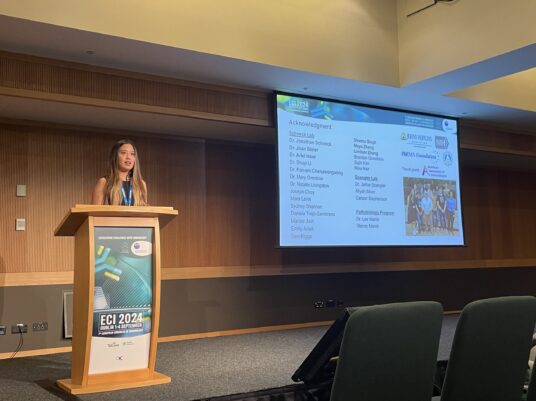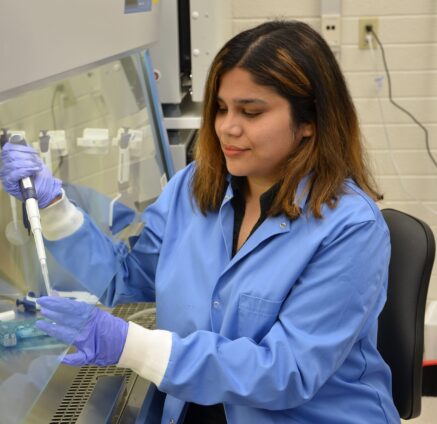Researcher Spotlight: A New Method for Expanding Cancer-Targeting Cells in Immunotherapy
September 16, 2024In her fourth year at Johns Hopkins, Si-Sim Kang received a 2024 PhRMA Foundation Predoctoral Fellowship in Drug Delivery for her research to improve adoptive cell therapy.

Si-Sim Kang’s first science project was studying her own rare autoimmune disease.
While in high school, she reached out to a professor at a local university who helped guide her. “I was able to tap into what research is like and what immunology is, and that inspired me to learn more,” Kang said. “I realized I really enjoyed research and solving problems.”
Kang moved to the United States in 2020 amid the COVID-19 pandemic to pursue her PhD at Johns Hopkins University. The transition was difficult because she didn’t know anyone, and the classes were very intense. “It was definitely a challenging moment to try to jump-start my career here in the U.S. during a pandemic,” she said.
In her fourth year at Hopkins, Kang received a 2024 PhRMA Foundation Predoctoral Fellowship in Drug Delivery for her research to improve adoptive cell therapy, which uses a patient’s own immune cells, called T cells, to fight cancer.
In this immunotherapy, T cells are taken from the patient’s blood and enriched in the lab so they can learn to find proteins called antigens on specific cancer cells and kill these cells. The T cells are then reinfused back into the patient. While immunotherapy has been revolutionary for certain cancers, it is expensive and ineffective for some patients.
Kang’s PhRMA Foundation-funded research project seeks to improve adoptive T cell therapy by focusing specifically on CD4 T cells, usually the “helper” T cells. We will use innovative nanoparticle-based artificial antigen presenting cells (aAPCs) to efficiently increase the amount and effectiveness of rare antigen-specific CD4 T cells produced during adoptive cell therapy. After incubating CD4 T cells with our aAPCs, the CD4 T cells acquired tumor-killing ability and the population of antigen-recognizing CD4 T cells increased from less than 1% to over 30% in some cases. By providing a controllable platform for T cell expansion and activation, our method offers new possibilities for personalized cancer treatments and deeper insights into T cell biology, potentially revolutionizing the field of cancer immunotherapy.
Kang’s PhRMA Foundation-funded research project seeks to improve adoptive cell therapy by focusing specifically on CD4 T cells, or “helper” T cells. Kang will use innovative nanoparticle-based artificial antigen presenting cells (aAPCs), which are three-dimensional platforms that activate T cells against a specific cancer antigen. She aims to increase the amount of antigen-recognizing CD4 T cells from less than 1% to over 30% in some cases, while also enhancing their cancer-fighting abilities. This method offers new possibilities for personalized cancer treatments and deeper insights into T cell biology, potentially revolutionizing the field of cancer immunotherapy.
Her advice for other early career researchers: “Seize every opportunity. Go for it. The worst case is people say ‘no,’ but then you don’t lose anything, and you might get a ‘yes’ once in a while.”
Kang recalled attending her first scientific conference when she was a first-year master’s student. “That was my very first experience of being part of the scientific community, and even though I was a young student, everyone was very welcoming,” she said. “That was when I realized that I really enjoy being part of this scientific community and this field of immunology.”
Fast forward to last year, as a third-year PhD student, Kang was invited to speak at the annual meeting of the American Association of Immunologists, the biggest U.S. immunology conference. “I presented my project — this same project that got funded — and I realized that people were really interested in my research and are willing to connect and potentially collaborate,” she said.
After she completes her PhD, Kang wants to continue doing research, either in academia or industry. “I’m leaning toward industry,” she said. “In an industry setting, it’s one step closer to the patient and to making a difference.”
Learn more about the PhRMA Foundation’s fellowship and grant opportunities. Check out more researcher stories on our blog.
